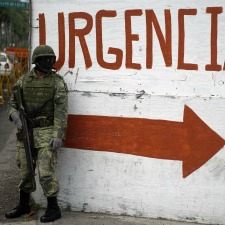BROOKE GLADSTONE: As you heard a few minutes ago, a few days earlier back in Mexico City, we got a quick briefing from the Committee to Protect Journalists’ Mike O'Connor. After Marianne left to catch her flight to Juarez, I asked him about Veracruz.
MIKE O’CONNOR: If you're a journalist in, in Veracruz and you’re approached by a criminal and told, “You have to work for me,” the last thing you, you think of doing is going to the police department because you know the police department works for the criminals, and you’re not going to go to the district attorney because the district attorney works for the criminals.
BROOKE GLADSTONE: You covered the Balkans.
MIKE O’CONNOR: For years. I liked that story.
BROOKE GLADSTONE: It’s not safe.
MIKE O’CONNOR: But that was combat or that was Sarajevo, where there was, you know, a lot of lead in the air and a there’s lot of people who were getting killed. This is different. You know, if you get killed in Veracruz, you’ll be killed because you're a journalist. They’ll go looking for you because of who you are.
BROOKE GLADSTONE: On the day I flew into the state of Veracruz, another reporter was murdered. Victor Manuel Baez Chino worked the crime beat for the daily Milenio in the state capital Xalapa. A message from the Zetas found near his body read, “This is what happens to those who betray us and try to be clever.”
[MUSIC UP AND UNDER]
Veracruz is now the most dangerous place in Mexico to do journalism, nine killed in 12 months, many by the Zetas, deemed the most sadistic of the cartels. Roughly 60 miles from Xalapa sits the Port of Veracruz, with a lovely central square lined with cafés and a band that gamely plays to mostly empty chairs. A few blocks away, the Parroquia, a cavernous coffee house with journalists cluster with their cameras, rising wearily to photograph a steady stream of candidates in these final days of a contentious election season. A woman in a white coat wanders through with a blood pressure cuff. It’s a great location to sell a stress test, reporters her prime targets.
A recent kill list of journalists was rumored to have come, not from the cartels but from the prosecutor’s office. Rumors are rampant. The only certainty is that reporters can expect no protection. This 23-year-old newspaper reporter who writes lifestyle pieces is terrified.
INTERPRETER FOR REPORTER: Mainly because I don’t know who can be listening to me, who can be watching me. It feels like every journalist is walking around with a target in his back. It makes me angry that, for instance, the state refused protection to some of my colleagues because they allegedly were implicated with the cartels or something like that. That is nonsense. They don’t know the circumstances in which these deals or agreements take place. Some colleagues have to do it because if they don’t do them, what will they do? Will they leave town? Where will they go?
BROOKE GLADSTONE: Elia Baltazar is co-founder of Journalists on Foot, a woman-centered nonprofit that provides support and training to journalists.
INTERPRETER FOR ELIA BALTAZAR: Try to think in another country where you would have the same amount of journalists murdered in such a short period of time. I mean, our colleagues who were murdered in Veracruz three weeks ago, these three people, they peeled their faces off. What kind of democratic country is that? The country is being silenced. Tamaulipas is in silence. Veracruz is in the process of being silenced. The silence is spreading.
BROOKE GLADSTONE: But Veracruz is not entirely mum. There’s a new paper in town.
INTERPRETER FOR LUZ MARIA RIVERA: My name is Luz Maria Rivera. I am the correspondent of La Jornada Mexico Daily in Veracruz. I am also the director of a new weekly that has recently been created, The Mercury of Veracruz.
BROOKE GLADSTONE: The new newspaper in Veracruz. Are you crazy?
LUZ MARIA RIVERA: Yes, I – I crazy. [LAUGHS] I crazy.
BROOKE GLADSTONE: The front page of your first issue has two articles devoted to violence against journalists. It doesn’t seem as if you're shying away from covering the violence in Veracruz.
INTERPRETER FOR LUZ MARIA RIVERA: It is a contradiction. Sometimes I say I want to – I don’t know how to call it – I will not keep a distance. Otherwise, I would have already left. When they killed Regina, we all got very scared, especially the women. Women journalists share a similar life. We are alone, with children. Our families live nearby but when you get home, we are alone. It is a very peculiar situation and there is no manual for it.
BROOKE GLADSTONE: This is a beautiful place where, by all accounts, the institutions are entirely inoperative. If you get the story out, it’s likely to make no difference. Do you feel like you're just putting a message in a bottle, throwing it out into the bay?
INTERPRETER FOR LUZ MARIA RIVERA: Of course, clearly. That’s an everyday part of journalism here, with the advantage that we have the sea. Our colleagues in the north don’t have it. They will have to go to the desert. Of course, it is throwing messages in bottles into the sea and thinking that maybe that nobody is picking them up. But one day someone will find them.
BROOKE GLADSTONE: We step out onto her tiny balcony and face the sea.
LUZ MARIA RIVERA: I feel too much love. [LAUGHS] I, I love Veracruz. I, I love my people, my country, my state, and - this city is beautiful.
BROOKE GLADSTONE: Luz bravely blows a kiss to the port she seems literally willing to die for.

